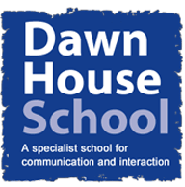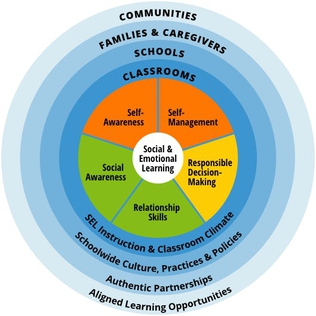
Dyslexia, also known until the 1960s as word blindness, is a disorder characterized by reading below the expected level for one's age. Different people are affected to different degrees. Problems may include difficulties in spelling words, reading quickly, writing words, "sounding out" words in the head, pronouncing words when reading aloud and understanding what one reads. Often these difficulties are first noticed at school. The difficulties are involuntary, and people with this disorder have a normal desire to learn. People with dyslexia have higher rates of attention deficit hyperactivity disorder (ADHD), developmental language disorders, and difficulties with numbers.
Special education is the practice of educating students in a way that accommodates their individual differences, disabilities, and special needs. This involves the individually planned and systematically monitored arrangement of teaching procedures, adapted equipment and materials, and accessible settings. These interventions are designed to help individuals with special needs achieve a higher level of personal self-sufficiency and success in school and in their community, which may not be available if the student were only given access to a typical classroom education.
Key Stage 4 (KS4) is the legal term for the two years of school education which incorporate GCSEs, and other examinations, in maintained schools in England normally known as Year 10 and Year 11, when pupils are aged between 14 and 16 by August 31.
Global citizenship is the idea that one's identity transcends geography or political borders and that responsibilities or rights are derived from membership in a broader class: "humanity". This does not mean that such a person denounces or waives their nationality or other, more local identities, but that such identities are given "second place" to their membership in a global community. Extended, the idea leads to questions about the state of global society in the age of globalization.
Digital literacy refers to an individual's ability to find, evaluate, and communicate information through typing and other media on various digital platforms. It is evaluated by an individual's grammar, composition, typing skills and ability to produce text, images, audio and designs using technology. The American Library Association (ALA) defines digital literacy as "the ability to use information and communication technologies to find, evaluate, create, and communicate information, requiring both cognitive and technical skills." While digital literacy initially focused on digital skills and stand-alone computers, the advent of the internet and use of social media, has resulted in the shift in some of its focus to mobile devices. Similar to other expanding definitions of literacy that recognise cultural and historical ways of making meaning, digital literacy does not replace traditional forms of literacy, but instead builds upon and expands the skills that form the foundation of traditional forms of literacy. Digital literacy should be considered to be a part of the path to knowledge.

Dawn House School is a specialist school run by the charity I CAN for children with severe or complex communication difficulties or Asperger’s Syndrome. It is in Rainworth, Nottinghamshire in the United Kingdom.

Furze Down School is a co-educational special education school in Winslow, Buckinghamshire. It is a community school, which takes children from the age of 2 through to the age of 19. The school has approximately 177 pupils.
Alfriston School is a girls' special school in Beaconsfield, Buckinghamshire. In March 2012 the school became an Academy. It takes girls from the age of 11 through to the age of 18 and has approximately 125 pupils.

Learning disability, learning disorder, or learning difficulty is a condition in the brain that causes difficulties comprehending or processing information and can be caused by several different factors. Given the "difficulty learning in a typical manner", this does not exclude the ability to learn in a different manner. Therefore, some people can be more accurately described as having a "learning difference", thus avoiding any misconception of being disabled with a lack of ability to learn and possible negative stereotyping. In the United Kingdom, the term "learning disability" generally refers to an intellectual disability, while conditions such as dyslexia and dyspraxia are usually referred to as "learning difficulties".

Management of dyslexia depends on a multiple of variables; there is no one specific strategy or set of strategies which will work for all who have dyslexia.
Values education is the process by which people give moral values to each other. According to Powney et al. It can be an activity that can take place in any human organisation. During which people are assisted by others, who may be older, in a condition experienced to make explicit our ethics in order to assess the effectiveness of these values and associated behaviour for their own and others' long term well-being, and to reflect on and acquire other values and behaviour which they recognise as being more effective for long term well-being of self and others. There is a difference between literacy and education.
Life skills are abilities for adaptive and positive behavior that enable humans to deal effectively with the demands and challenges of life. This concept is also termed as psychosocial competency. The subject varies greatly depending on social norms and community expectations but skills that function for well-being and aid individuals to develop into active and productive members of their communities are considered as life skills.

The Chiltern School is a coeducational special school located in Houghton Regis in Bedfordshire, England. The school accepts pupils from all over the Central Bedfordshire area.
Ivel Valley School is a coeducational special school, located in Biggleswade, Bedfordshire, England. The school accepts pupils from all over the Central Bedfordshire area, and was opened in September 2010 on the site of Sunnyside School.
Educational neuroscience is an emerging scientific field that brings together researchers in cognitive neuroscience, developmental cognitive neuroscience, educational psychology, educational technology, education theory and other related disciplines to explore the interactions between biological processes and education. Researchers in educational neuroscience investigate the neural mechanisms of reading, numerical cognition, attention and their attendant difficulties including dyslexia, dyscalculia and ADHD as they relate to education. Researchers in this area may link basic findings in cognitive neuroscience with educational technology to help in curriculum implementation for mathematics education and reading education. The aim of educational neuroscience is to generate basic and applied research that will provide a new transdisciplinary account of learning and teaching, which is capable of informing education. A major goal of educational neuroscience is to bridge the gap between the two fields through a direct dialogue between researchers and educators, avoiding the "middlemen of the brain-based learning industry". These middlemen have a vested commercial interest in the selling of "neuromyths" and their supposed remedies.
The term emotional literacy has often been used in parallel to, and sometimes interchangeably with, the term emotional intelligence. However, there are important differences between the two. Emotional literacy was noted as part of a project advocating humanistic education in the early 1970s.

Vale of Evesham School in Evesham, in the county of Worcestershire, England, is a special needs school for around 150 mixed gender pupils aged 3 to 19 of whom approximately 35 are in the 6th form. It caters for children with special educational needs and also accommodates 15 pupils as boarders on a weekly basis.
Newbridge Learning Community is a Special Educational Needs School in Wigan for pupils who have emotional, behavioural or social difficulties (EBSD). The school was formed from the merger of Kingshill Special School and Highlea School and opened in October 2008. It has fewer than 100 pupils.
Global citizenship education (GCED) is a form of civic learning that involves students' active participation in projects that address global issues of a social, political, economic, or environmental nature. The two main elements of GCE are 'global consciousness'; the moral or ethical aspect of global issues, and 'global competencies', or skills meant to enable learners to participate in changing and developing the world. The promotion of GCE was a response by governments and NGOs to the emergence of supranational institution, regional economic blocs, and the development of information and communications technologies. These have all resulted in the emergence of a more globally oriented and collaborative approach to education. GCE addresses themes such as peace and human rights, intercultural understanding, citizenship education, respect for diversity and tolerance, and inclusiveness.

Social–emotional learning (SEL) is an educational method that aims to foster social and emotional skills within school curricula. SEL is also referred to as "socio-emotional learning", "social and emotional learning", or "social–emotional literacy". In common practice, SEL emphasizes social and emotional skills to the same degree as other subjects, such as math, science, and reading.








